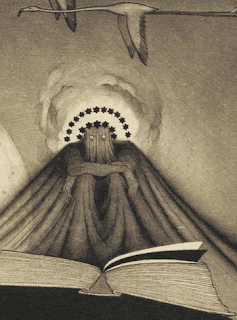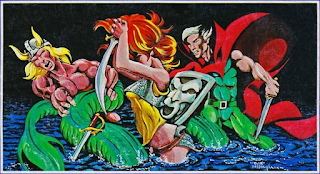 |
| Sidney Sime |
I was looking in my "Shared With Me" folder on my Google Drive and came across what appears to be a file by that Mike Mearls outlining his house rules for BX D&D- one of his favorite editions. I reproduced them below.
The context for the rules seems to be tricks picked up from 3e/4e experience and applied to BX D&D rather than house rules that arose at the time he might have played BX. I think.
[Edit in 2025: For reference here is how Gary Gygax ran his games]
Points of interest:
- Save throws as just d20 DC checks
- Theif skills are DC check but with a bonus based on the BX % divided by 5. So "open locks" in BX starts at 15%, by these house rules it would be a d20 DC check with a +3 bonus
- Starting HP = Max HP + half CON score (which on average should allow 1-2 extra hits)
- Looks like race-as-class is split to "race" and "class" but with a few bonuses. For instance, you could be a dwarf magic user which would allow you to increase your HD size one step (d4 --> d6), use "find/remove traps" as a thief, and have infravision
- Standardizing resolution mechanics (d20 4 eva) and removing % rolls and I'm sure X-in-6
- Increasing survivability by increasing HD size and HP amount
- Increasing player options by expanding access to magic, weapons, and starting character combinations (16 combinations vs. 7 BX classes)
Mike Mearls 1981 D&D House Rules
Ability Mods: We use the 3e/4e convention (+1 or -1 per 2 above/below 10)
Saving Throws: These are ability checks, DC determined by DM
Attacks: Ability check, plus a class-based bonus
Fighter: +1 every odd level
Cleric/Thief: +1 at level 3, 6, 9, 12, 15, 18
Magic-User: No bonus
Thief Abilities: These work a bit differently.
- Open Locks, Find or Remove Traps, Pick Pockets, Hide in Shadows are all things only thieves can do. Hide in shadows is literally that - hide in situations where other people can’t. The thief makes a check with a bonus equal to the % listed on page B8 divided by 5.
- Move Silently, Climb Sheer Surfaces, Hear Noise are all things that anyone can try. The rogue has the advantage when he tries any of them.
Advantage: Roll an extra d20, take the highest result. If you get advantage more than once, take an extra die.
Disadvantage: Roll an extra die, but take the lowest. If you have advantage, disadvantage zaps one die per instance of disadvantage.
Hit Points: Upgrade everyone by one die type, you get maximum hit points at level 1 + half your Constitution score.
Hit Dice: You can use your hit dice to heal. You get hit dice equal to your total HD, spend them when resting, each die gets a bonus equal to your Con modifier.
Characters
- Dwarves: Increase class’s hit die by one size. Infravision 60 feet. Can use Find or Remove Traps in underground locations.
- Elves: Can alternate between magic-user and any other class, have infravision 60 feet.
- Halflings: Can Hide in Shadows as a thief, get a +2 bonus to AC, but use an HD one step smaller and can’t use two-handed weapons.
- Humans: Gain a +1 bonus to any two stats, or +2 to one stat (maximum 18).
Weapons: d4, d6, d8, or d12, class access based on die size
Fighter: All
Cleric: d6, bludgeoning d8
Thief: d6
Magic-User: d4


No comments:
Post a Comment